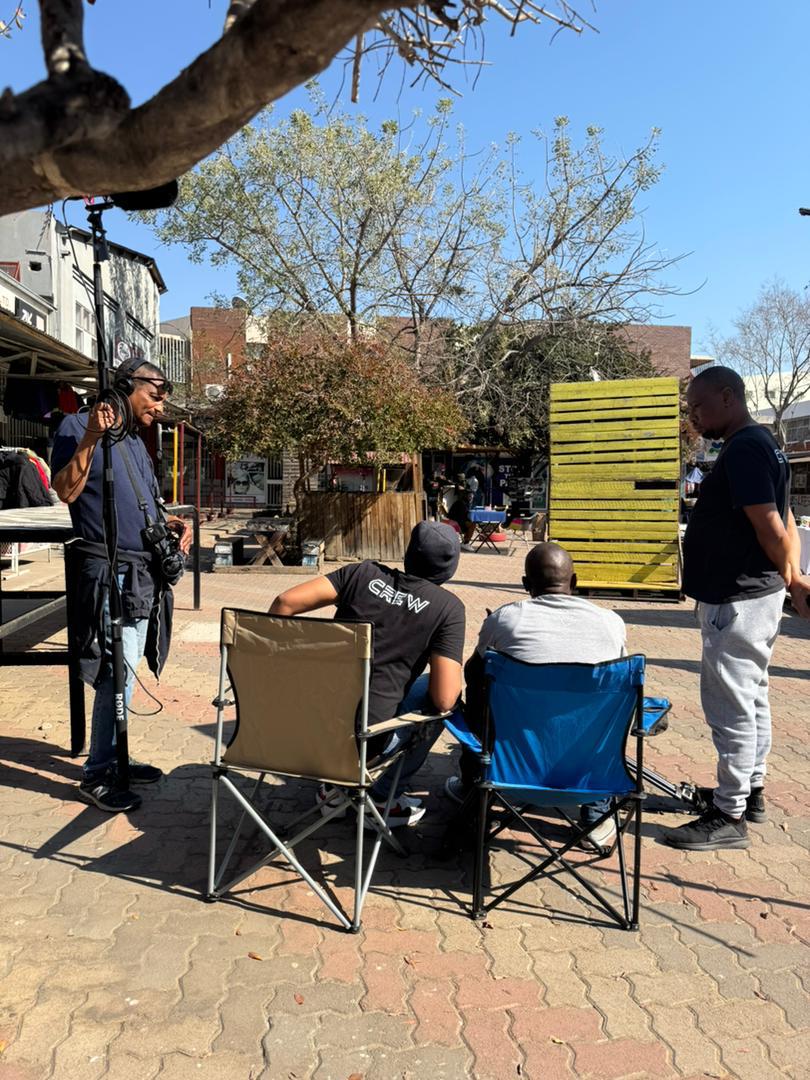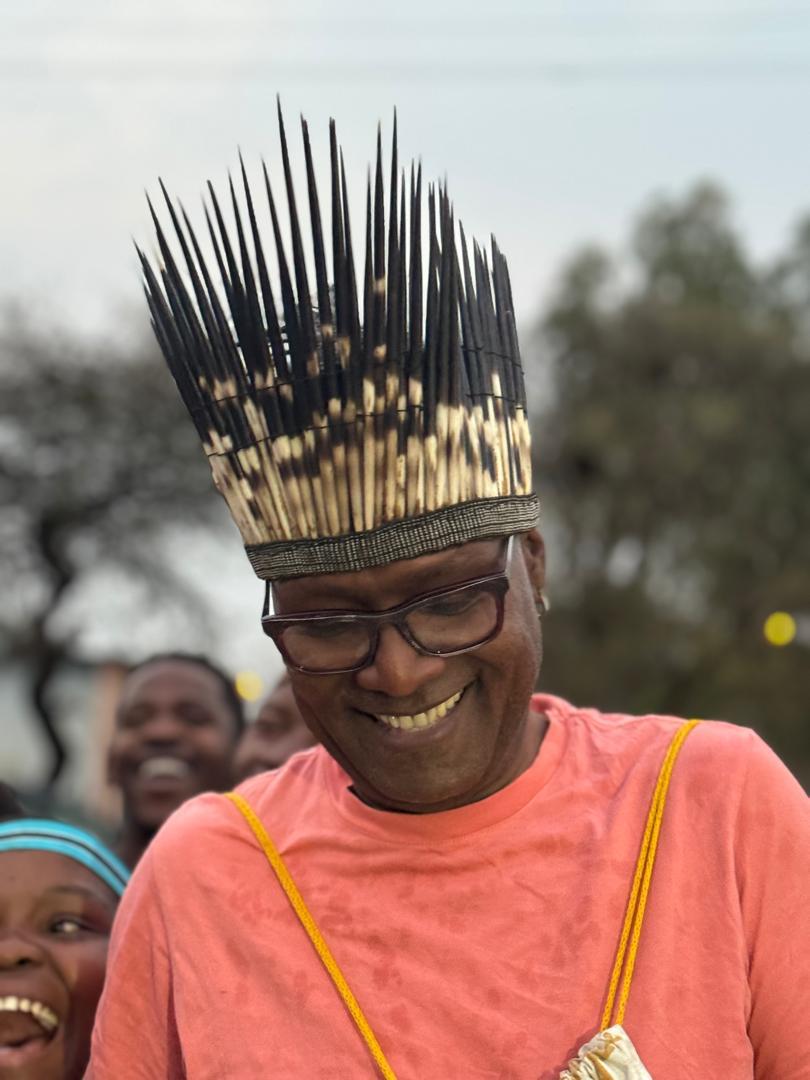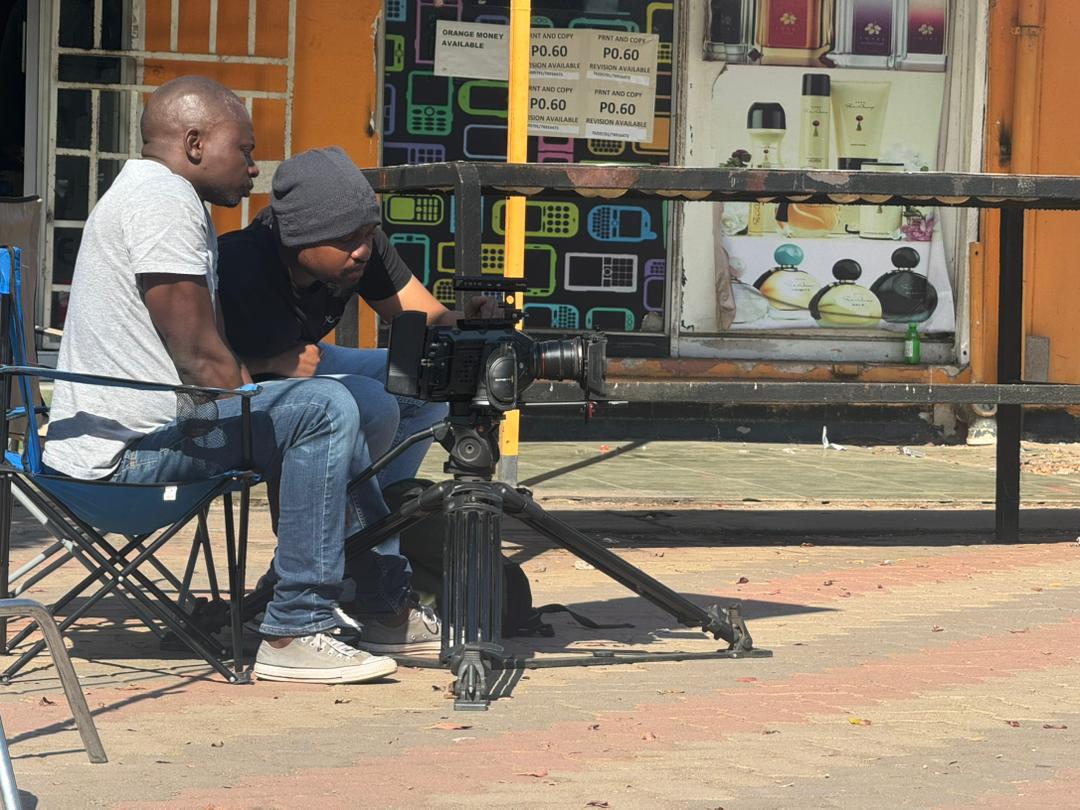Mogolokwane
MOGOLOKWANE
Translated into English, ‘mogolokwane’ is known as ululation. In Setswana culture, ululation signals a number of important aspects of our cultural identity. On one hand, the sound is associated with the celebration: rites of passage, coming home, achievement, birth. But mostly, ululation connotes the joy of marriage: the bringing together of two families who may not have much in common, but together despite the differences, to build a new family. On the other hand, the sound demonstrates the variety of skills that women have in ululating; the better skilled “ululants” can conjure heightened emotion in all who are present for the celebration. Additionally, ululation is a sign of accord and affection; a willingness by all present to celebrate and acknowledge excellence. Ululation marks important moments that are worth observing and remembering. Because silence, quite literally, signals death, we must be sure to make a fuss about the things that we hold dear.
Mogolokwane Incubator for the Arts therefore speaks directly to the cultural expression of the country. Our aims are to nurture skilled artists who can take pride in their creative works; to bring different creative practices and paradigms together in a marriage that will enrich practitioners of the arts in the country and abroad; to archive our cultural products so that we can trace and retrace our creative rites of passage as artists, educators and Batswana; and finally, by investigating our national and historical identities through artistic media, we can better engage in intellectual exchange with other nations and their approaches to the arts.


Mogolokwane Incubator for the Arts is a direct response to the necessity for and the provision of:
- a high standard of education and training in the arts that will produce qualified and competent professionals;
- creative material and dialogue that fulfils the aesthetic need(s) of the country;
- The archiving and sharing of Botswana’s cultural products;
- The development of the arts in Botswana through intellectual trade.
Botswana does not yet have a National Theatre. The art industry has been gravely neglected leaving the national community without a medium for socio-cultural reflection. The rich culture of this beautiful nation will die out, be passed-by, and or be lost if we do nothing as citizens. It is important for every people to define themselves through their own culture. Mogolokwane provides the facilities and expertise to enable stories of Botswana to be told by its people and creators, to ensure Batswana know themselves, even before such narratives are packaged into touristic lore.
MOGOLOKWANE IS NECESSARY AND SUSTAINABLE
The aims with which we define the purpose of Mogolokwane are also the foundation we use to demonstrate the necessity and sustainability of the Incubator for the Arts.
Training and generation of professional artistic skills Botswana is uniquely placed on the continent in terms of her people’s access to free education up to and including tertiary training. The citizens and residents therefore have the opportunity to consume and experience television, computers, world music and other kinds of media and technology. As a result, the country has a fairly stable supply of well-trained medical, business, engineering and other professionals. There is, however, a paucity of trained creators of the arts: theatre makers, musicians, filmmakers and so on; people who are professionally and rigorously trained for their artistic works. Consequently, the country produces very little creative material that can stand up to critical scrutiny, and even less, materials that can be located on the cutting edge of creative practice both regionally and internationally. Thus, Mogolokwane has begun the process of building a solid base for arts practitioners who are both creatively and academically adept, and whose knowledge and skill can contribute to the cultivation of the country’s creative identity, as well as a platform for public dialogue around pertinent issues and shared cultural values.
Creative material and dialogue that fulfils the aesthetic need(s) of the country.
The widespread challenges that we are experiencing as a country are, indeed, many and varied, and all require robust engagement by all citizens. Mogolokwane will facilitate learning by artists such that they are equipped to conduct critical analysis of material, and then with the same critical eye, construct creative work that encourages the same level of critical engagement from all audiences. It is no longer enough, we think, to create ‘sketches’ with didactic messages as a method of responding to individual social concerns such as the HIV and AIDS pandemic. Neither is it enough to imagine that ‘sketches’ are the best that our artists can do, and the most sophisticated offering we can give to our communities. Our challenges are complex and sophisticated, and our artistic practices must necessarily be sophisticated and sharp. After all, at Mogolokwane we believe that the arts are not just a platform for dissemination of information; the arts can influence change of attitudes, thought, behaviour and interaction. The arts can facilitate healing by encouraging laughter, sharing and reflection.
Archiving and sharing of Botswana’s cultural products
As an institution of learning, Mogolokwane places great value on the capacity to retain creative output in a systematic manner that allows for post-production engagement. Archiving creative work, functions beyond building a sizeable library of the country’s cultural products. It also facilitates learning through reflection and hindsight; any learners of film or theatre or music can consult an archive for past creative practices, for experimental breaks that inform paradigm shifts, for material that can support inter-textual or interdisciplinary referencing. In other words, archiving functions to teach learners, and educators, to engage the general public, to protect knowledge and preserve the country’s creative heritage. For as long as Botswana has any kind of identity, an archive of the social commentary carried through by storytellers and musicians, painters, theatre makers, filmmakers and dancers, will be necessary.
Development of the arts in Botswana through intellectual trade
At Mogolokwane we understand that education plays a vital role in social and cultural development, and for that reason we have established relations with cordial research institutions and those of higher learning with an aim to influence and be influenced by their academic programmes. Through working with various institutions - such as the University of Botswana (UB) and University of the Witwatersrand (WITS) - Mogolokwane will play its part in conducting research and making findings of such research or case-studies more accessible to users. With such developments in knowledge, Mogolokwane will also offer on-site training to aspirant practitioners through attachments and internships. Rooted as we are in fostering positive cultural awareness, participants will be encouraged to generate developmental ideas and own initiatives that will have a positive impact on Botswana’s cultural future. We are informed in this regard by cultural overlaps that exist between the communities of Southern Africa, and have thus designed our programmes to enable interns to locate a niche within their disciplines, where their influence may motivate, not only refinement of sensibilities, but also change. Mogolokwane will govern, support and guide them in their projects to ensure that their dreams are institutionally supported and their goals met. The fundamental strategy of capacity building is to learn by doing, so participants and trainees will divide time between working with mentors, facilitators, researchers, and other scholars to cultivate skills needed to uplift their livesand their communities through their works.
WHAT MOGOLOKWANE OFFERS
- Professionally trained local and international academics and practitioners as trainers and facilitators.
- Courses and workshops across disciplines designed specifically to cater to the needs of Batswana as artists and Batswana as consumers of cultural products: Film, Theatre, Music, Dance, Fine Art, Public Speech, Creative Writing, Photography and others.
- Training programmes range from foundation level to professional graduate level.
The development of the arts in Botswana through intellectual trade.
- Facilities and infrastructure for learners to apply and experiment with the material offered in the courses.
- Performance and display spaces for professional artists to showcase their work: live music, theatre performances, art exhibitions and interdisciplinary installations.
- Venues for international artists, educators, learners and institutions to dialogue in conference or symposium style settings.
Our Stakeholders
The stakeholders in the projects Mogolokwane engages with are, for the most part: the youth, trained and amateur artists, members of the public, academics, educational institutions, civil societies, government, the corporate sector, embassies, traditional leadership, practitioners of the healing arts and facilitators.

A Case Study On The Sustainability Factor To Arts And Cultural Competitions And Events
A Review Of Th e President’s Day Activities and Constituency Arts Competitions.
SYNOPSIS:
The President’s Day and Constituency Arts Competitions are an admirable and necessary socio-cultural and creative intervention that holds great potential for the transformation of the country’s ambiance, creative texture and career opportunities for the youth of the country. The necessity for these competitions highlights the greater need for a sustainable avenue for the youth and creative producers to pursue through their professions. These activities also provide a means through which the youth can build themselves up creatively and financially, as well as contribute to a constant fl ow of national dialogue and cultural production. Over and above all, the development of the arts have an important role to play in refi ning the appreciation of the crafts, developing good aesthetics and national taste among Batswana as creators, producers and consumers of creative works.
Current challenges of the competition:
- It is possible for winning participants to win with a margin of up to 60% between the highest scorer and the lowest. This means that varying degrees of skill and training are adjudicated at the same level; effectively lowering competitiveness of the overall standard of work produced.
- Because there is no specification on the levels, types and degrees of training that participants can have, participants with varying backgrounds in the arts compete on the same platform. On the one extreme, this lowers the standard of work produced (generally lowering the national expectation around the arts as legitimate crafts and practices); on the other end of the spectrum, the discrepancies between the capabilities of artists may discourage those with little or no training from participating. Worse still is the risk of dampening the motivation for excellence in those who come to the competitions with appreciable levels of training.
- While participants have some time between phases of competition, they reach all levels of competition without necessarily having improved their craft. In this way, artists do not grow through the competition, but rather, they simply face their fellow competitors afresh in a different venue, with ever decreasing numbers of competitors. This does little or nothing to sharpen the edge of craftsmanship.
- Competitors can take part on competitions every year, but without heightened expectations or improved skills. Thus, if a participant struggled with their work the previous year, they may not be able to improve in subsequent years.
The winning participants are not held accountable for their winnings, and are not expected in any official or traceable manner to further their craft. Consequently, where the cycle should continue in order for the competitions to be justifiable as sustainable, it stops because artists are not compelled to take their work beyond the initial competition arena.
Artists have no professional tutelage in their field, which makes it difficult for them to grow creatively and financially.
A means to mitigate the identified challenges:
Mogolokwane posits that an intervention to address the above challenges must:
- Delineate categories of competition by degree of training levels, even within wards and constituencies. For example, all amateur artists compete in one category, while all artists with a particular level of training in another category within the same discipline, and prizes therefore be awarded at amateur levels for their respective disciplines as well as more experienced, professional artists in the same discipline being recognised for their distinguished excellence.
Why this works:
- Artists can be assessed on their level of competence in all fairness;
- Artists can then be guided throughout the phases of the competition in order to help them approach the next level of expertise;
- Artists and the competition organisers can build reasonable expectations and traceable development of artists who return in subsequent years and thereby apply a developmental aspect to their assessments of known artists.
- Provide artists with tutelage in-between the phases of competition such that there is actual growth in competences, understanding and practice in the discipline and profession.
Why this works:
Artists are not simply progressing to the next stage of competition because others did not make it. They progress because they have received extra honing of skills and coaching and are applying skills from their lessons to their work in preparation for subsequent levels of competition;
- Artists are gaining more than the prize money out of the performance. They are receiving the opportunity to experience what it means to hone their skills and become competitively competent locally and beyond the borders of Botswana;
- When artists receive training their work is more sophisticated, more pleasing to themselves and their audience(s) and far more likely to become a financially rewarding and therefore viable source of income;
- The need for professionally trained artists to coach emerging creative aspirants will lure established artists back to Botswana, and possibly attract international producers to headhunt familiar levels of competence and talent;
- The amassing of artistic personnel of different competencies, within the country, will in the end reward society by making it possible for the creation and sustainability of art-based businesses, and the building of art venues that will sell different products of arts. This will feed directly into the touristic endeavours of Botswana and the diversification of the economy through the creative industry.
- Create coaching rubrics that correspond to the requirements of the competition assessment guidelines and standards
Coaches and participants will work on specific and achievable agenda/objectives that they are all familiar with;
- A good possibility for tutelage will have been created, that will facilitate feedback from adjudicators who can then refer back specifically to materials that require review, in a language and atmosphere that both parties understand because they have been working with coaches;
- Participants are more likely to be cognizant of the tasks set for them, and so can apply their thinking and practice to the specificities of the tasks, using familiar rubrics.
- Formulation of a post-competition initiative clause for all winning participants which requires improvement of technical and creative skill, market competitiveness and social intervention.
- Tutelage would create a situation where participants would be required to enter the competition with a clear objective of wanting to learn (more than they already know) so as to apply, rather than to enter simply to win a once off prize;
- Such subsequent coaching would encourage participants to think of their craft as a life long career and a potentially viable income generation stream for the livelihoods;
- It creates sportsmanship and camaraderie among practitioners; it would also force artists to interact over extended periods with others in their field in order to exchange ideas. That would in itself contribute to the identification and articulation of national aesthetic needs through the interaction of creative practitioners, to ensure that there is constantly a flow of training and application of new concepts, conventions and innovations;
- Such training and honing of skills would bring to the fore the importance of giving back to the community when one has been given to. Winning participants would, in addition to the monetary prize, be helped to create and sustain initiatives that would justify the taxpayers acquiescent spend on and the President’s sanctioning of the competitions;
- It would ensure the sustainability of the competitors and deepen the development and economic value of the competitions to Batswana.
The logistics of the execution of the intervention require:
- Discernment and due diligence in the planning, organisation, coordination and reporting of the competitions and related events;
- Pool professionally trained artists to coach participants;
- Access to various arts centres such as studios, galleries, libraries, museums and so forth;
- Provide appropriate materials for practice and execution such as appropriate rehearsal attire, PA/ sound systems, musical instruments, props and costumes, audio visual equipment and recordings to show examples of performances across the world, dance mats and mirrors as well as books and writing materials;
- Provide transport logistics for participants and coaches to various destinations around the country, which may be relevant for the coaching;
- Provide recording facilities to record various stages of coaching for archive purposes;
- Create clear legal documentation about the expectations of participants and coaches, the code of conduct, the objectives of the coaching body as well as safety precautions

